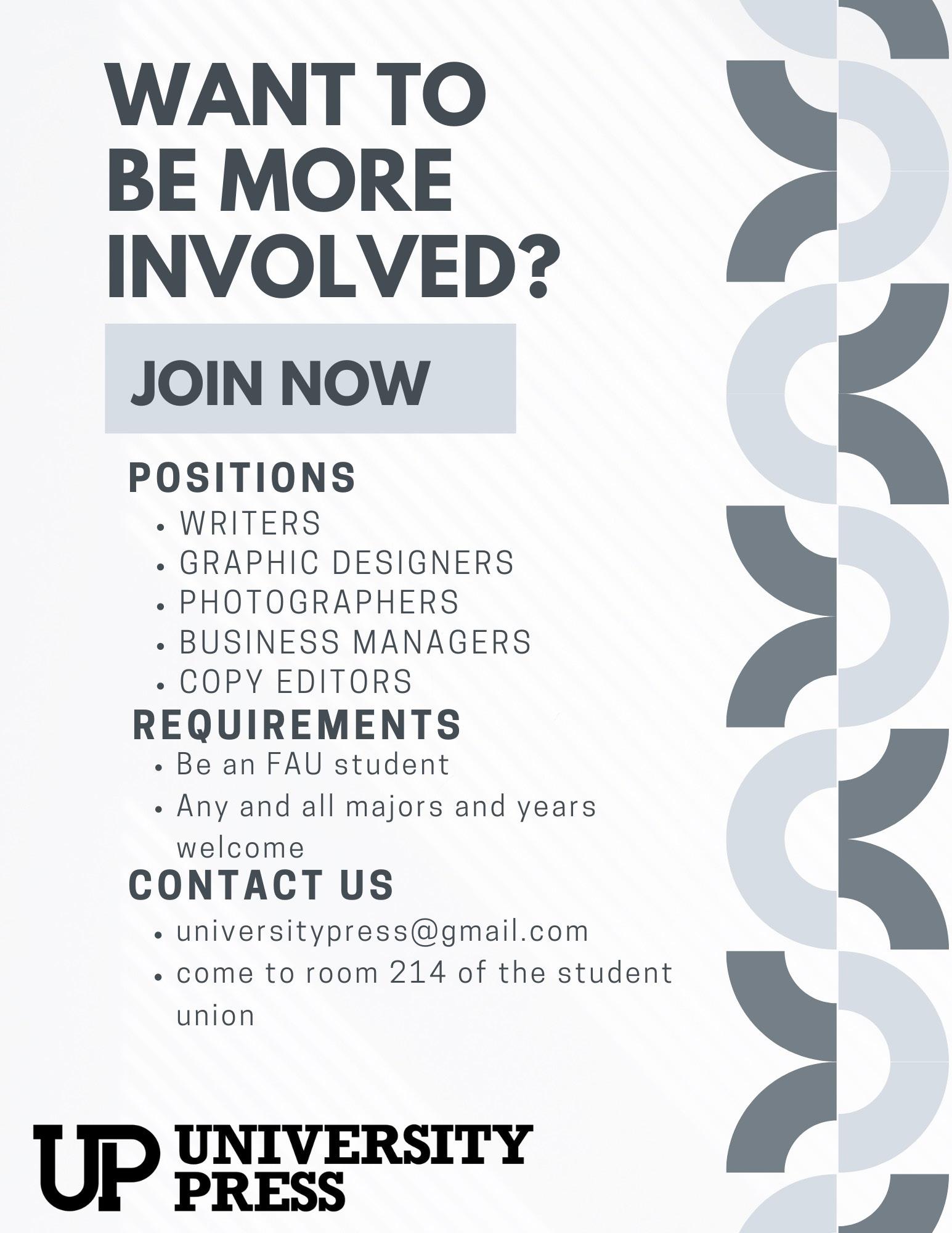Thousands of students struggle with suicidal ideation each year, and some from your university say they are waiting longer to get into the counseling center.



Thousands of students struggle with suicidal ideation each year, and some from your university say they are waiting longer to get into the counseling center.


University Press is the only news outlet dedicated 100% to informing and protecting the FAU community.
Savannah Peifer | Editor-in-Chief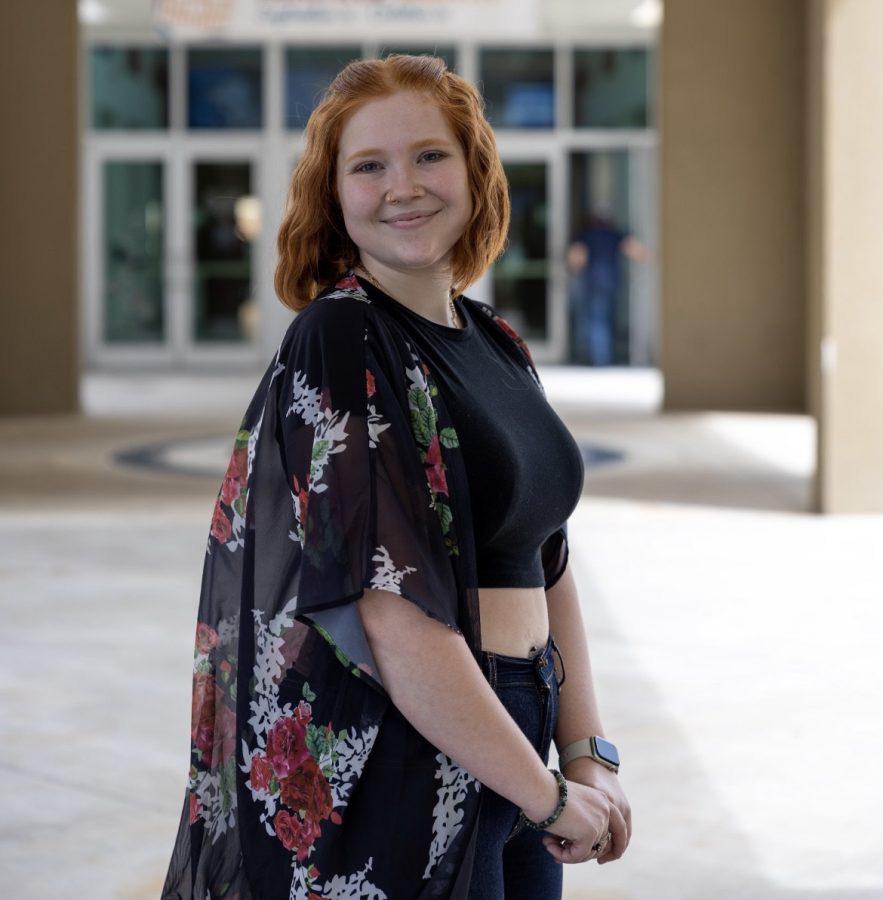
University Press was formed on the basis of serving and protecting the FAU community. However, there still are questions as to why students and faculty should interact with the UP.
With a new semester beginning, I’ve decided to share the top reasons you should care about student media.
1.UP is one of the only protected ways to hold the university accountable.
Last semester the university denied us public records. We then took a stand and threatened to sue the university. At the time of publication, we are in another battle with the university, as they are trying to charge us $6,000 for records.
If the university is willing to hide things from us, what are they willing to hide from you?
As student journalists, we are protected from retaliation from the university. So are you.
When you speak to any member of the press you are automatically protected from retaliation from the university. Meaning, student media is the perfect opportunity to amplify your voice and show the universities wrongs.
You may be what the UP needs to uncover what is truly happening.
Regardless of your future endeavors, one of the best things you can do to strengthen your resume is to be published. UP is not only created
for journalists. As editor-in-chief I am not a journalism major, but political science.
You have the freedom to write what you want. Want to be a future lawyer? Write about law. Want to be a doctor? Focus on the medical aspect of student life. We even have job opportunities for graphic designers, photographers, and more.
If you are not in a paid position, UP writers often interact with professors, administration, Student Government representatives, and more. This allows you to build connections and relationships with these individuals, which is one of the most important aspects of going into the world after graduation.
When you do something extraordinary, the UP wants to spotlight that success.
Whether it be student research, a big student organization event, or something else you’ve done with FAU, you can contact UP. Sharing your success with UP is another fantastic way to set yourself up for success once you leave FAU. Not only that, it’s an amazing way to celebrate your achievement.
Without your interaction and input, the UP cannot serve the FAU community how it is meant to. If you want to get involved or have story tips, contact us through email at universitypress@gmail.com or contact a staff member directly.
The University Press talked with Interim President Stacy Volnick to discuss her opportunity to lead FAU heading into 2023.
Richard Pereira | Staff WriterAs 2023 goes underway, incoming Interim President Stacy Volnick is representing Florida Atlantic University starting Jan. 1, after President John Kelly officially stepped down and became university president emeritus.
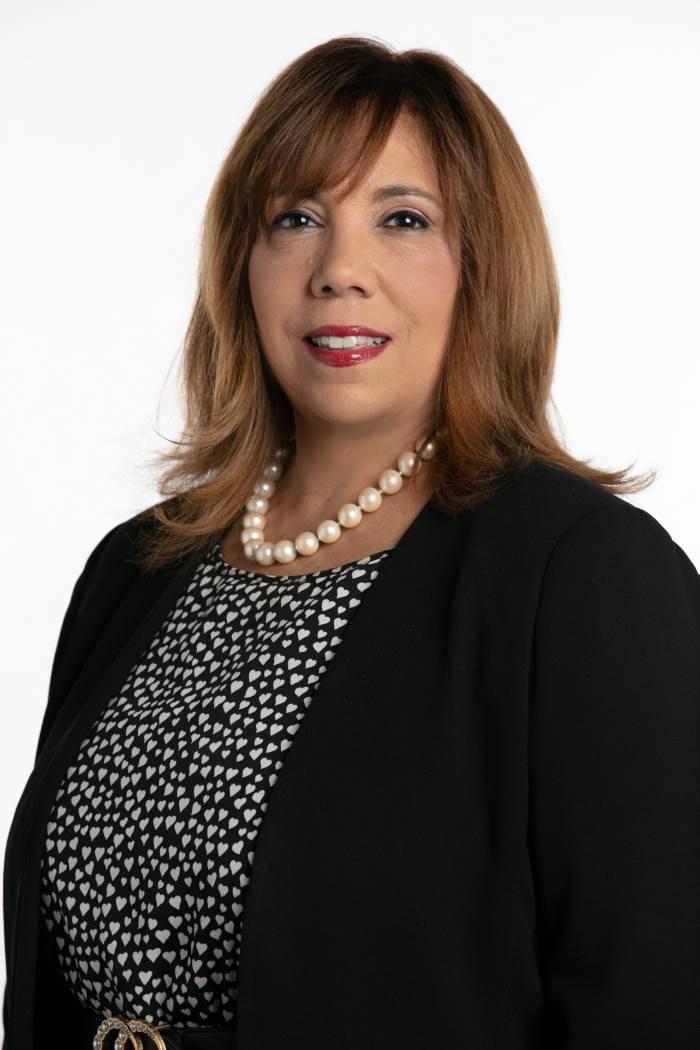
The University Press sat down with Volnick to talk about her chance to lead FAU heading into 2023.
The interview has been edited for accuracy and clarity.
UP: What are your thoughts on becoming interim president of Florida Atlantic University?
SV: I think it’s an exciting time. I’ve been at the university since 1991. As a matter of fact, I was at the University Press in the late 1980s when I was a student, but then it was called the Free Press. I’ve sort of grown up here. It’s sort of like that pinnacle to your career. And interestingly enough, I just defended my dissertation and no one would have known that my topic, when I started, was on [female] university presidents. That was the focus of my research. It’s sort of an ironic twist in my career, if you will, marrying my academic pursuits that I’ve recently had with my professional role as I go into the interim status.
UP: What made you interested in the position of Interim President?
SV: I was approached by the [Board of Trustees]. I’ve worked with our [BOT] for many years. My office is in the President’s suite. I’ve worked closely with President Kelly and prior presidents. I think from an administrative perspective, it gives me that next view of the operations of a university, and [I’m] certainly willing to step into that role with the years of experience I’ve had at this university while they search for the next president, and hopefully to help that person transition.
UP: How does your experience of 25+ years in higher education qualify you for the position?
SV: I’ve been in administrative roles in higher ed from the beginning. I really started my career in business services. I had that entrepreneurial focus, that business focus and worked in financial affairs for 23 years. I’ve got that perspective on the budgetary and financial operations of a university. I’ve served as interim inspector general so I understand the nature of regulatory compliance, etc. That’s important in particular in a public university. I’ve served as interim vice president of advancement over the years so I have that fundraising. The roles that I’ve served permanently, plus those that I’ve served as interim over the years, gives me a very well-rounded view and experience of how a university operates for a short time.
Public affairs reported to me [as well] so over the years, I’ve had the opportunity to really get to work within the different areas and get to know the people that are here and what they do. It gives a perspective and an appreciation for all of the components that really make up the runnings of a university.
UP: What are your plans heading into 2023 as Interim President?
SV: Some are obviously to support the [BOT] as we conduct a presidential search, to support the university and the [BOT] in a number of the priorities: FAU Health, FAU 100, which is really around students’ success, [and] the College of Dentistry. I think what’s really important too, and I’ve talked to others about this, as we come through COVID-19, we really have an opportunity to get back together. I know that might sound a little hokey, but I think it’s important to start rebuilding what a campus or organizational culture is like, and [whether] that’s through student events, faculty, and staff, or bringing people together to rebuild the culture that I think in most organizations, have struggled with in a post-COVID world. I think that’s really important [for] morale [and] culture. People have to be really excited about coming in every day and knowing that whatever your role is at the university, you’re here to make a difference in a student’s life.
UP: How will you work with university officials to get these plans done?
SV: From an operational response to COVID-19, it gave me the opportunity to work with our faculty in particular, and in many of the other areas at the university. I think that they know me and they’re excited about the opportunity of bringing people back together. I think that the whole world is struggling in this post-COVID world in particular with staffing challenges [and] workforce changes. We have to learn to adapt to those and find a way to develop a campus culture that makes people excited about being here.
UP: How will you strengthen FAU’s connection with the student body, considering it’s one of the most diverse in the state of Florida?
SV: That’s something I think is really important to me and beyond just the numbers. We can say we’re the most diverse and that means we have “X” percentage of this and we’re Hispanic-serving, but it’s really about culture. It’s about people learning from each other and having the opportunity to work and learn with people from all over the world and all over this country. I think that’s something that really needs to be capitalized on or promoted. I think that’s a real opportunity that not everybody has, depending upon the organization that they work or learn in.
UP: What are your best strengths that will allow you to succeed as Interim President?
SV: I’m an operations person so a crisis, a challenge, COVID-19, police matters, etc., I approach those things in a very methodical way. And those aren’t just the bad things that happen at a university. I think when you’re looking at projects, initiatives, [and] special events, you have to look at things methodically. Have a plan, work towards that plan, [and] bring in others knowing that there’s no one person that can do everything. I always say to people I work with that we’re a team. It doesn’t matter where you are in that pecking order. I think that’s really important to pull in the people that have the strengths in their area of expertise to build a team that we need to get us through this next period of time, which includes a period of substantial change.
There are a lot of unknowns when you’re going through a presidential search. Who is that person going to be? What is going to be their special initiatives? What’s the new strategic plan going to look like? I think it’s really important to quell those fears, as we work through that inevitable change.
UP: What challenges do you think you’ll face as Interim President?
SV: I think higher ed is facing challenges generally. I mentioned the workforce issues, and that’s something that really is going to take some real focus on. What it is going to take to strengthen and continue to build a workforce that’s needed to support our students? What do students want as we move forward in providing a learning environment? There’s this debate over online versus in-person [classes], so how do you provide what students want but still give them a collegiate experience? Which I think is important. I think we’re all facing these challenges, and I think it’s really how to live, learn, and work in a post-COVID-19 world.
UP: Will you be involved in the search for the next FAU President?
SV: Yes, I’m the liaison to our Board of Trustees. I work very closely with them in my current role as the chief operating officer so I expect that to continue.
UP: As FAU finds a permanent replacement, what do you want the university to be in the long term?
SV: I think we should look at what our strengths are. I think diversity is important. Many of our students come from the local community. What are the workforce needs of the state that we all live in and how can we, as a university, focus our resources and our efforts so that we are not only educating students but preparing you all so that when you leave here, you have a career path that fits with what the needs are of the state of Florida and beyond. [...] It’s important for me to listen to what students want. I work closely with the student body president, who’s a trustee, but I want to expand that. I don’t pretend to know what an 18-to-24-year-old wants, so I need to hear from an 18-to24-year-old group of people about what [they’re] looking for in the university. I think that’s really important, to do more listening than talking about what I want to do.
UP: Speaking of having a bigger connection with the student body, when a lot of students come up to you and say, ‘hey, we think there’s an issue that has to be resolved very soon,’ how are you going to do that?
SV: That’s something I’ve done since I’ve been here. Whether it was 20 years ago with business services, having food service advisory groups on what kind of brands students wanted on campus, to even now in my role and working in the president’s office meeting with students, parents, etc, when there’s an issue. That’s not anything that’s new to me. It’s what I do now. It’s about listening to what the issue is and helping students find solutions.
UP: Anything else?
SV: I think as a triple alum, a former member of the Free Press, I think it’s an exciting time for me but I hope it’s an opportunity where I can really hear from the students. I feel like there is a need to bring people back together, whether that’s in person [...] to really hear what students are looking for in the university. That’s what I look forward to, creating priorities that are based on what students want.
FAU.
Students say they have encountered longer wait times for counseling services during the Fall 2022 semester, after Florida Atlantic University welcomed the largest freshman class in its history.
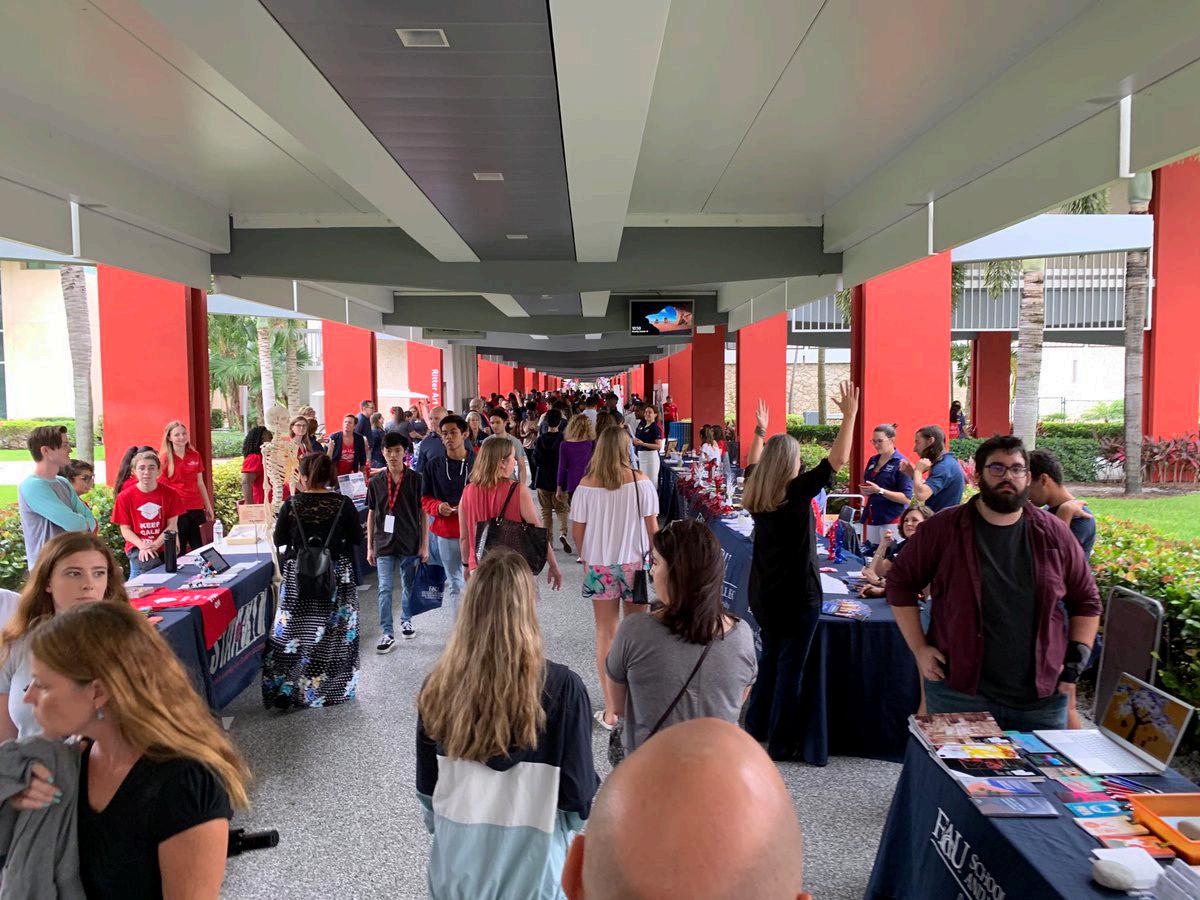
With 22 clinical staff members and 30,000 students across its three campuses, the staff-to-student ratio at FAU’s counseling center is 1-to-1,364. This ratio falls within the standard set by International Accreditation of Counseling Services (IACS), an organization that focuses on accrediting professional counseling centers on higher academic campuses, of one counselor to every 1,000-15,000 students.
FAU also employs two psychology residents who carry the same workload as the 22 full time senior staff clinicians, three part-
time doctoral interns, and four part-time licensed clinicians.
According to FAU’s Annual Reports, Counseling and Psychological Services (CAPS) satisfaction surveys report an overall increase in student participation since 2016 — following a nationwide trend of increased demand for psychological services.
Leonette Copeland, CAPS’ assistant director of outreach and consultation, explained the increase in enrollment and the growing number of students interested in utilizing their services have presented a challenge.
“If you think about how many registered students are at FAU, it would be really tough to guarantee weekly therapy and long-term therapy to all of those students,” Copeland said.
Nonetheless, the linear trendline indicates that despite variations in demand, the number of students attending long-term or “ongoing counseling” continues to increase since the 2016-17 academic year.
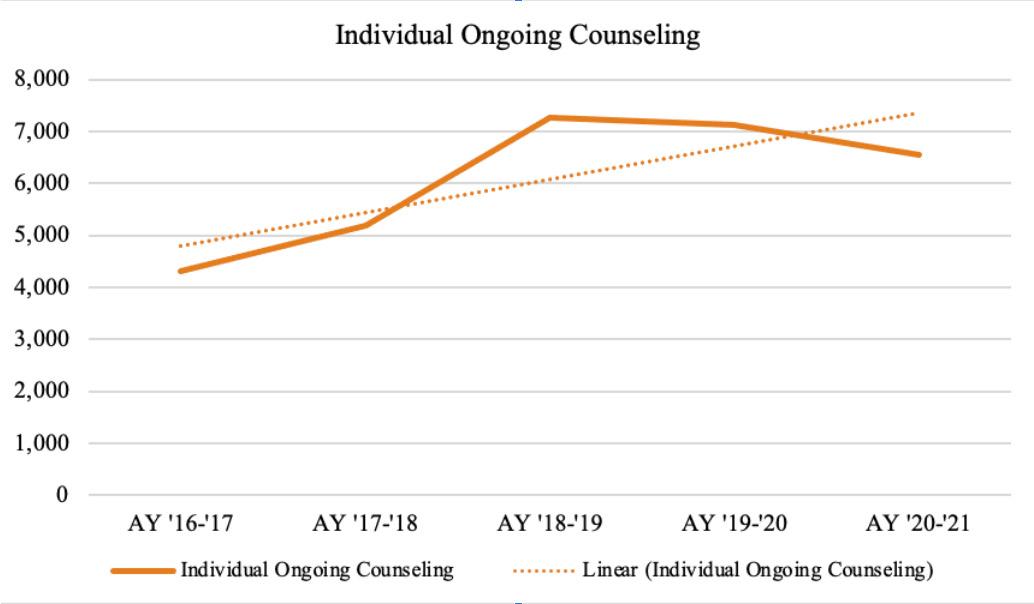 Source: FAU Annual Reports
Source: FAU Annual Reports
Institutions of higher education have provided counseling and other psychological services to students for more than 160 years. Even before the onset of pandemic stresses, universities have witnessed trends of increasing demand for long-term mental health services.
“Five to eight years pre-COVID the focus really was on year after year increase and demand on services […] that continues to be an issue,” said Scott Strader, licensed psychologist and director of the Counseling Center at the University of South Florida.
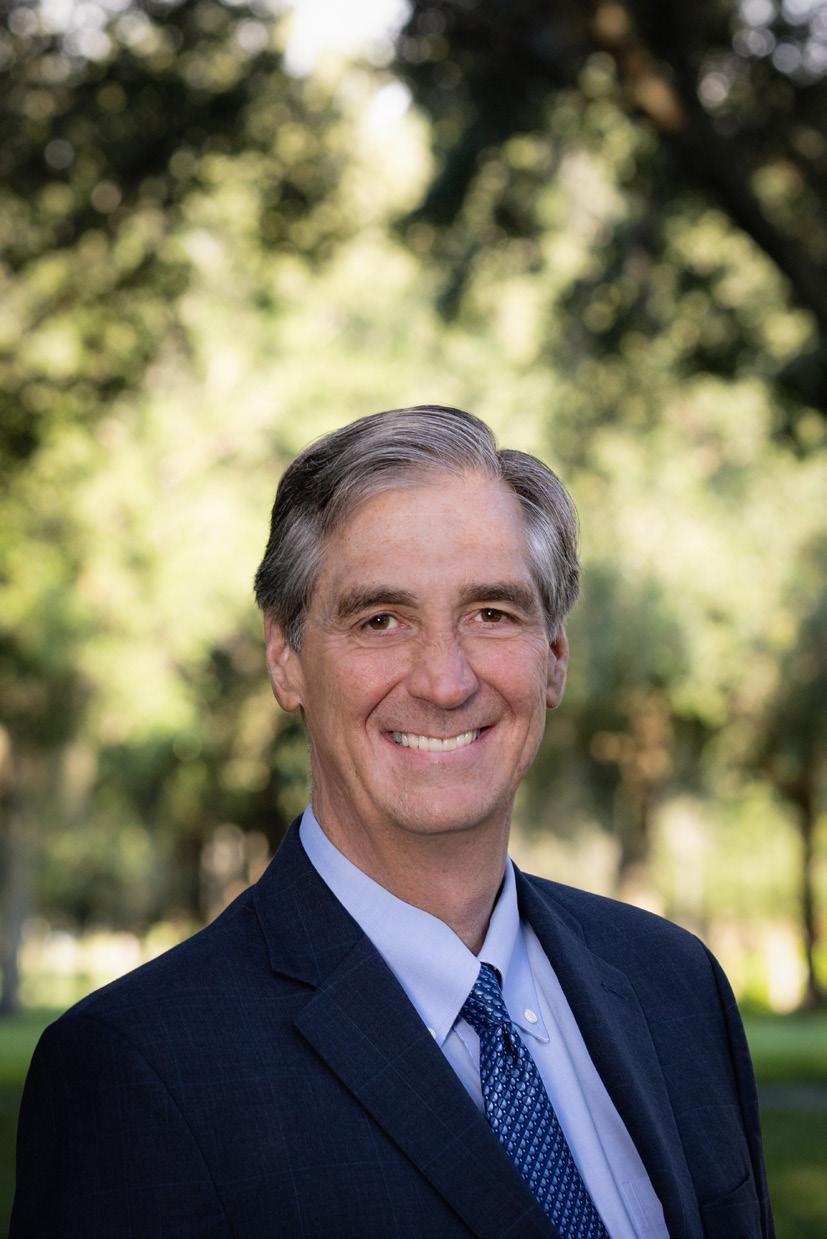
Hannah Tuttle, a senior majoring in physics, believes there should be long-term mental health care on campus. “I don’t see why you can’t get long-term therapy for free or a reduced price,” she said.
The origins & evolution of college counseling
CAPS’ original function in higher education was to provide short-term guidance to students as they transition away from home, into adulthood, and then into the workforce.
Counseling Psychologist Alison LaFollette, who has her own practice based in Salt Lake City, Utah, claims the demands of college students have changed significantly since they are increasingly looking for long-term services.
Dr. David Kraft, a psychiatrist based in Massachusetts, wrote in a 2011 paper that the counseling model changed once universities began to accept veterans and realized students were abusing drugs and alcohol.
Justine Kantor, a sophomore criminal justice major and director of Psychoeducational Programming within the university’s student
government, expressed concerns of drug and alcohol abuse.
“That’s what I’ve noticed to be a big factor in mental health declining. [Students are] not leaving their rooms, and they’re sitting in there and they’re smoking weed all day,” Kantor said.
Strader and Kantor referenced COVID-19 as a primary factor for the noticed uptick in student visitation. Students’ hesitation to intimately engage with one another post-COVID has resulted in high levels of loneliness, according to Kantor.
Copeland suggested that social movements normalizing conversations surrounding mental health on and off campuses have encouraged mental health transparency and communication, resulting in what may appear to be an uptick in mental illness amongst the college population.
“I don’t know if I’m seeing an increase, as if it’s things that are more of a problem, or if we’ve done really well [destigmatizing mental health] that you just have more people willing to talk about it,” Copeland said.
The convenience and accessibility of mental health care on campus attracts students who may not have the resources like health insurance to outsource care.
Psychiatrists Dr. Victor Schwartz, from New York University, and Dr. Jerald Kay, from Wright State University, wrote in a 2009 paper that the use of campus counseling and psychological services as a primary source of health care has also been a factor to the issue where student demand has “outpaced the capacity and rate of growth” of school counseling.
Student perspective on the crisis
Tuttle first chose to use CAPS for its free service when other therapy options were expensive.
She said service at CAPS was great and wait times were not bad at first. That changed during the summer of her freshman year when CAPS decreased the frequency of her sessions from an hour-long weekly visit to a half-hour biweekly visit while her symptoms were worsening.
Staff members ultimately referred Tuttle out of the Counseling Center.
“They told me they couldn’t deal with the severity of my issues,” she said.
Tuttle shared that the counseling center staff explained they are based on short-term specific therapy and not designed to deal with mood disorders like depression.
“The reason we work from a shorter-term model is because our services are supposed to be accessible to registered students,” Copeland said.
Tuttle believes being referred out was better in the long term because she has “a stronger network of people,’’ but she was worried about affording therapy at the time.
Kyrie Bradley, a senior political science major, has been using CAPS for two semesters and noticed an uptick in wait times this semester.
“I’ve gone sometimes three weeks without meeting with a CAPS’ adviser and that’s been a bit of a hassle to try and get around when CAPS is incredibly helpful as a service, and when it’s restricted like that, it becomes a hindrance,” Bradley said.
When first-time students request an appointment at CAPS, they get it within the week of their initial request, according to Copeland. Students, however, have criticized the wait time to get a follow-up appointment.
Tuttle said her boyfriend got an initial appointment the week
he requested one from CAPS, but then had to wait seven months for a second appointment with a professional.
“I think there may be either not enough therapists or too much demand, because every time we checked online there were no appointments. And we checked in person several times and there were no appointments,” she said.
Copeland mentions that the field of counseling in general is susceptible to staff turnover.
“Even if you have a full staff fall, by the end of spring people might be like ‘I want to move to California,’ so you may not always maintain [staff],” Copeland said.
Heather Saunders is a postdoctoral fellow at the Program on Medicaid and the Uninsured at the Kaiser Family Foundation, a non-partisan, nonprofit organization focusing on analysis of health policy, public health, and national health issues.
Saunders said the prevalence of mental illness in the university setting is high, but often time goes untreated.
People between the ages of 18 and 25 have the highest prevalence of mental illness and substance use disorders out of all age groups, according to Saunders.
“Even though the prevalence of mental illness is the highest of any group, they are the least likely to receive treatment,” Saunders said. “Only 45% of people with mental illness between the ages of 18 to 25 receive treatment compared to 61% of adults
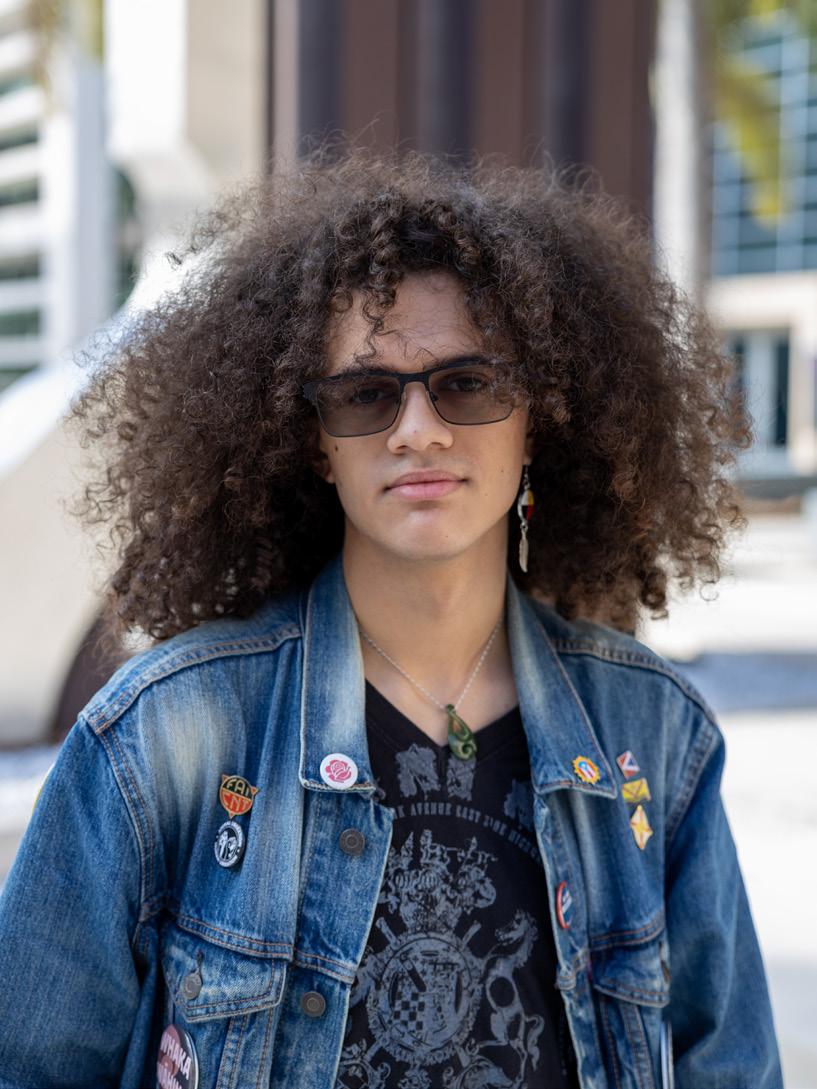
Saunders partly attributed the deficit of treatment in this age group to the lack of insurance. She said the rate of uninsured individuals is highest amongst young adults between the ages of 19 and 34. She also mentioned the difficulty navigating the healthcare system and the workforce shortage as possible contributors.
“Even when people do reach out for help, it’s difficult for them to find and access treatment,” she said.
According to Saunders, the lack of accessible treatment for mentally ill students often results in worsening symptoms, secondary diagnosis, low GPA and high dropout rates. Her research shows that one in four university students report suicidal ideation and 9% report attempted suicide, and trends indicate these statistics are on the rise.
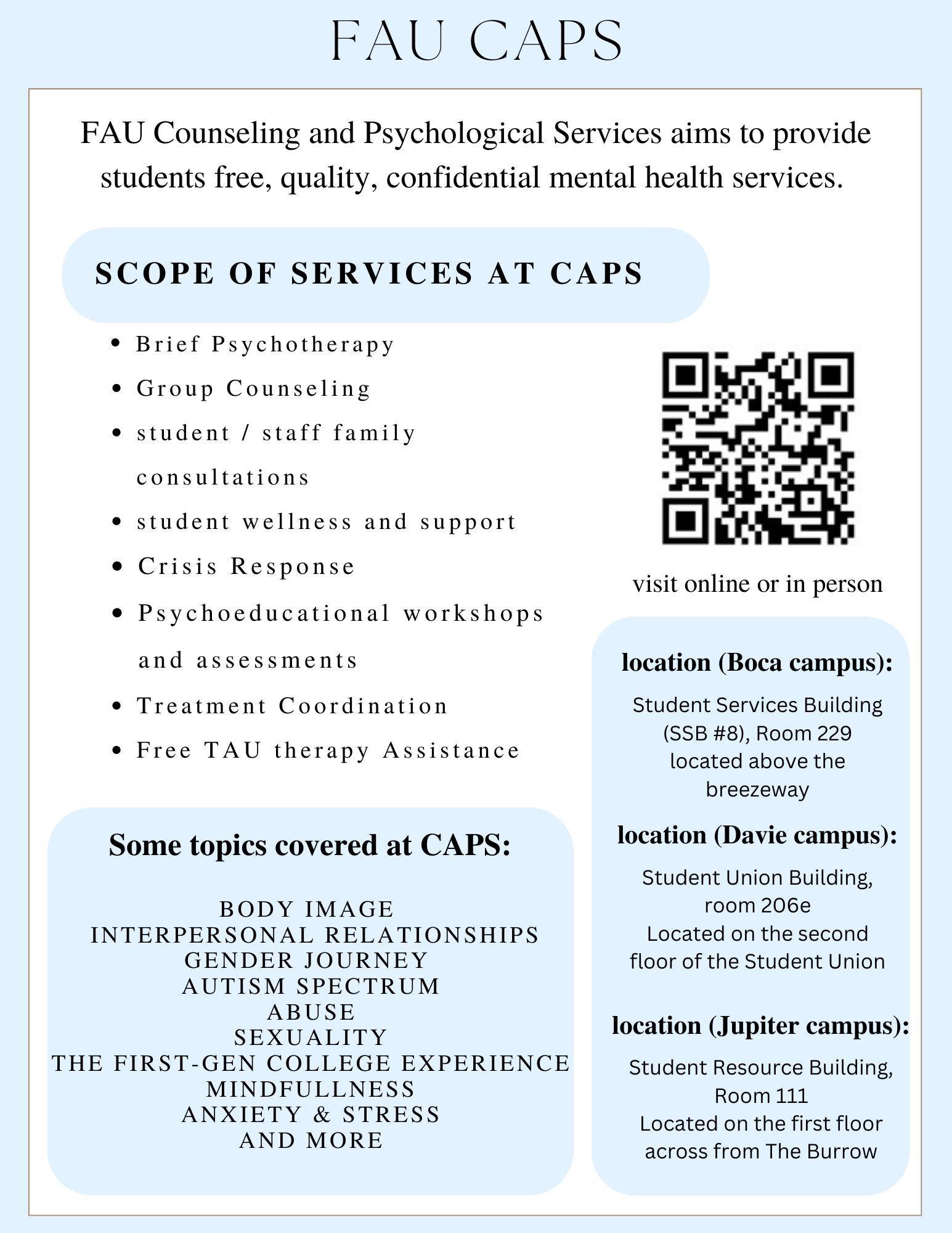
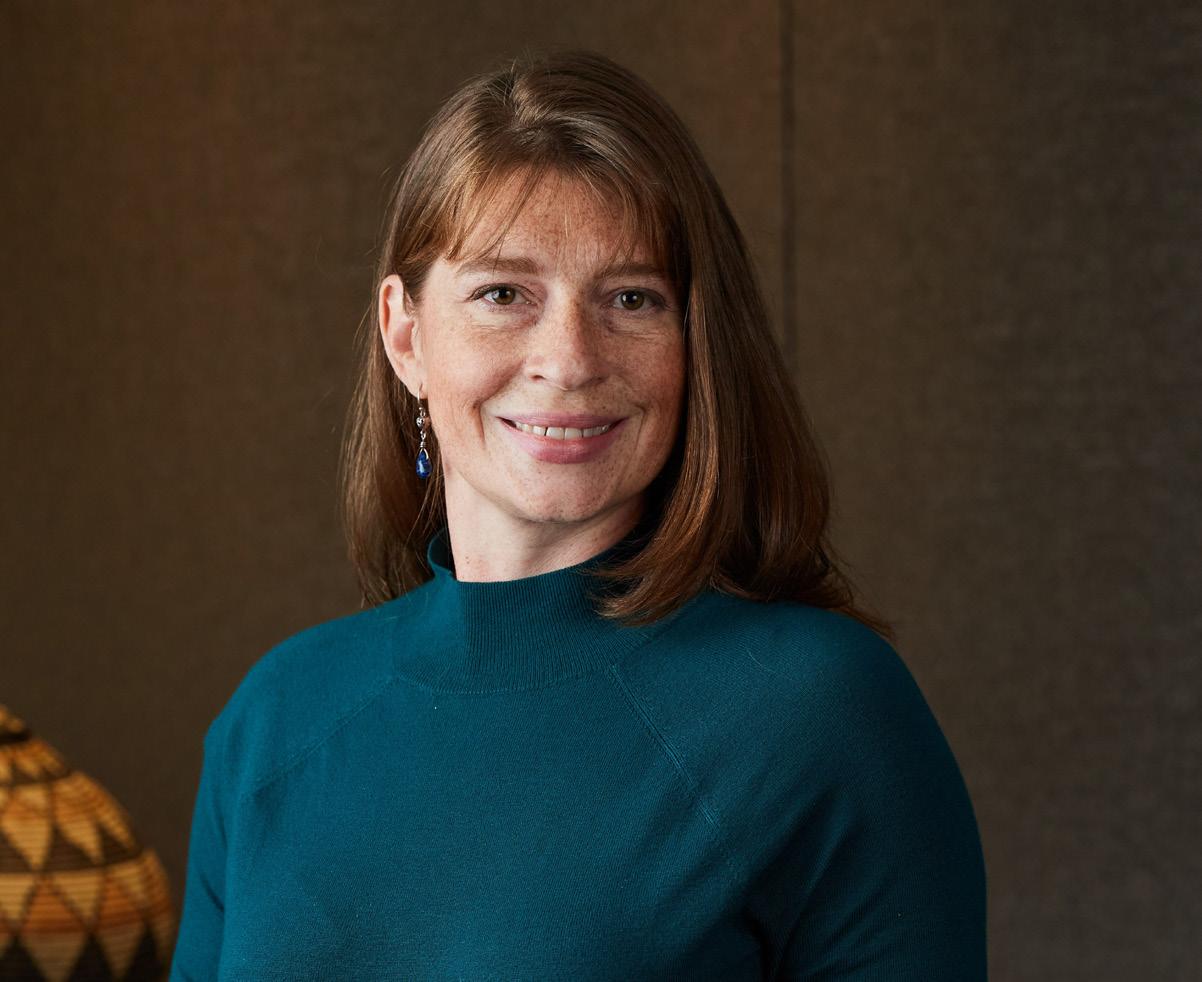
Climate change has a major impact on South Florida, including the weather and politics. Climate change has been exacerbated in recent decades due to human activity and the burning of fossil fuels, such as driving cars. A report published by Florida Atlantic University details the climate change in the state, and specifies that over 90% of adults in Florida believe in climate change.
The National Centers for Environmental Information presents evidence of a worsening climate. The report specifies temperature differences on land and in the ocean, as well as in different hemispheres. It also outlines the 10 warmest years in history, nine of which being from 2005-2019.
Colin Polsky, FAU Professor and Director of the Center of Environmental Studies
In 1988, climate change began coming to the forefront. At the time, Republicans and Democrats were very much in disagreement about the issue. Polsky says that Republicans denied any real scientific validity to the belief that humans caused climate change. Polsky believes that Republicans started to pay attention to climate change for one of two reasons: profit or trying to help the environment, which is a social problem. Either way, he thinks Floridians will benefit from increased environmental protections.
He explains how republicans are, historically, obstructionist on the issue of climate change, so he is happy that things are changing, as Florida’s republican government has passed some environmental action recently. He also believes that republican attitudes toward the issue have completely changed. Polsky believes that over 50% of republicans are aware of climate change and worried about it.
“To the point now where even our U.S. Congress, which is legendary for not being able to do much because they’re so partisan and split on all sorts of topics, including over the years climate change has actually gotten some stuff done lately,” Polsky said.
Polsky urges people who do not have enough science behind climate change to check out this website. The website answers questions that people have regarding science, including climate change, and can be broken down into different knowledge levels of readers.
“It’s a true encyclopedia of all of these questions that people have that are natural, and the answers,” Polsky said. “It’s organized into kind of like elementary level, intermediate, and advanced so that everyone can get what they’re looking for.”
Polsky says that Floridians can do so many things to protect the environment, including not polluting or putting up condos in the everglades. He describes two categories of things people can do. “We can mitigate or adapt, which means either reduce the greenhouse gases that we’re putting into the atmosphere in the first place, or do things to respond to the changes that are coming,” Polsky said. “And most people say we have to do both.”
Lapensee founded the club because she saw little involvement on campus and to educate people about environmental issues. The club engages in environmental activities and community service work, such as beach cleanups and a plant garden on campus.
Lapensee points out that a big problem of climate change and advocating for the environment is politics. The topic is polarized heavily, often by a Democrat Vs. Republican mentality.
She states that people believe in climate change, but don’t think of it as a priority.
“Some of the ways that we see already, the effects of climate change, are in stronger hurricanes and hurricane season, oftentimes lasting longer and starting sooner than it used to, “ said Lapensee. “The people who are running your community, they’re the ones where you’re going to see the most change more fast and how you want things done than compared to state and federal levels.”
90% of Floridians believe in climate change and, as Florida is coastal, people can expect more flooding and stronger hurricanes.Jessica Abramsky | News
the market to help the college athletes right now,” said Bryan Rammel, founder of the Owl Collective. “And ultimately, right now, the NCAA just allowed NILs to happen less than 12 to 18 months ago. So, it’s kind of like the wild, wild west.”
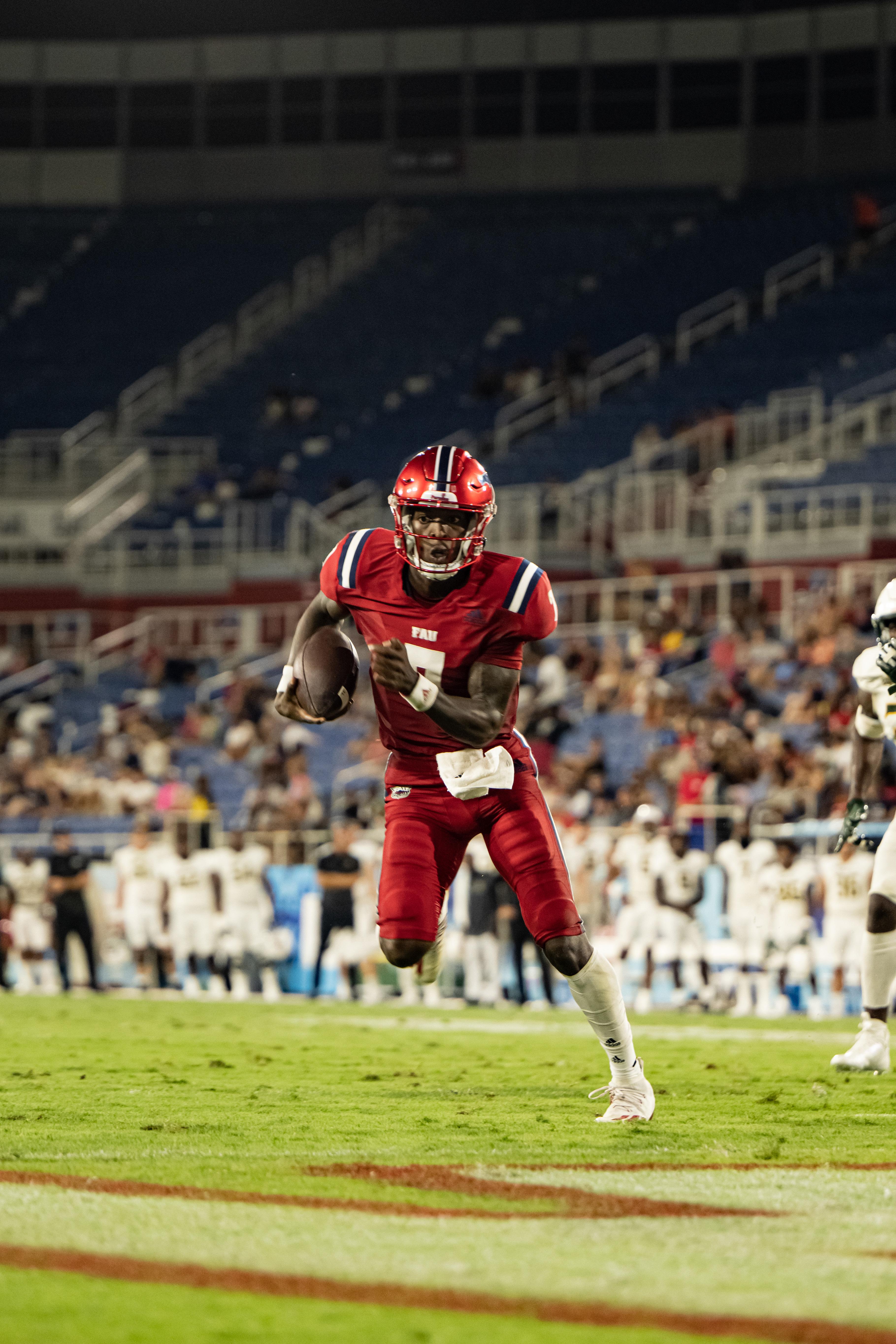
commercials for Dr. Pepper and others.
Since the NCAA allowed collegiate athletes to make profit from their deals, it has been difficult to organize this new shakeup.
Universities began forming collectives amidst the confusion to
facilitate sponsorships from businesses while protecting students, such as Syracuse University and the University of Georgia.
With FAU joining the American Athletic Conference (AAC) next year, there will be more televised games on networks such as ESPN.
Rammel has been connecting with local businesses in Boca Raton with his experience in marketing and consulting to help, and getting in touch with coaches on campus.
“[The Owl Collective wants] to take advantage of NIL here in Boca Raton, a city that is very affluent. Lots of networking, lots of money, lots of opportunities,” Rammel said. “It wants to be positioned in this NIL market with all the local businesses because South Florida, at the end of the day, has more businesses than anyone else, I would say.”
Rammel has gained support from former FAU players, boosters and alumni. Boosters are individuals who have connections to help the university with money and resources.
The Owl Collective helps student-athletes own their assets, earn compensation for challenges, NFT (non-fungible token) creation, and more.
“We want to make [the student-athletes] aware that someone is out in the community looking [out] for them on their behalf,” Rammel said.
Other resources have emerged to assist students such as OpenDorse Ready, a tech platform that helps student-athletes know the best day and time to post on social media to grow their brand, and the FAU Athletics Compliance Office, which helps collegiate athletes follow the NCAA’s strict rules regarding NILs – listing the deal, the job, and the payment for that sponsorship.
“[OpenDorse] is where brands and student-athletes can both get on, and our compliance office can see everything going on to protect our student-athletes from inadvertently doing something or not documenting something well enough that they inadvertently jeopardize their own eligibility,” FAU’s Athletics Director Brian White said.
Cara Simpson, women’s track and field athlete, benefits through OpenDorse. She has 25 NIL deals, with companies like She Makes Club, a paper-crafting business Simpson helped start, and Ryder, a fitness clothing brand.
“I am very well organized. So, when it comes to NIL deals, I set aside certain days and times when I’m only focused on that and only working on those things. Outside of that, I’m fully focused on my sport and academics,” Simpson said. “It hasn’t done anything to hinder performance or academics, or grades, or anything.”
Star quarterback N’Kosi Perry also signed with NIL deals. He was the first collegiate athlete in North America to sign with an alcoholic beverage company, Islamorada Beer, based in the Florida Keys.
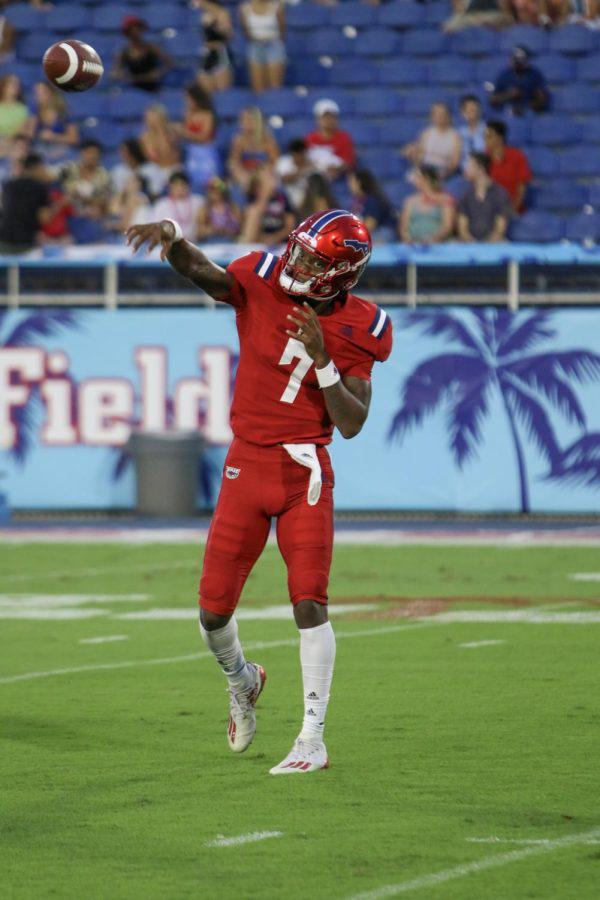
Perry also signed up with First Round Management (FRM), which helps athletes with media training, creative services like editing and videography, strategic alliances with different clothing brands, draft preparation, and more.
“I think it is a great start for the future,” Perry said regarding the benefits of working with a management company.
Resources like Daniel Lust, advisor to the NIL Pro Bono Project, focus on the legal aspects of NIL deals. Lust and his team of attorneys educate New York law students about NIL deals so they may get involved in that aspect of the law.
FAU also began its own marketplace, which offers a “quick, seamless opportunity for businesses, sponsors and supporters to reach out
directly to FAU student-athletes regarding NIL opportunities in accordance with state laws and NCAA regulations,” according to a newsletter the university published on Nov. 8, 2022.
The Owl Collective is specifically for FAU student-athletes. OpenDorse Ready’s contract with FAU lasts from Nov. 1, 2023, to Oct. 31, 2024.
The NCAA Division 1 Board of Directors recently initiated the do’s and don’ts for universities involvement with NILs, from offering connections between student-athletes and sponsors to forbidding universities giving free services to their student-athletes unless those services are given to the general student body.
While companies are signing student-athletes to be a part of NILs, Lust has some doubts. Originally, student-athletes picked institutions based on location and playing time.
“[Some students] don’t want money to be factored in. But in the last year, that money is certainly influencing a lot of decisions,” Lust said. With this new chapter for student-athletes, Perry spoke for the majority.
“We felt like athletes before and we don’t think that we got paid enough for the amount of time that we put in because not only are we students, but we’re athletes as well. So it’s like two full time jobs. So actually being paid something is better than nothing,” he said.
N’Kosi Perry throws the ball to his teammates during pregame warmup. Photo by Jaden Wiston.Imagine living in these conditions: an insufficient amount of laundry machines, broken machines, a laundry thief, water pressure being too hot or too cold, and the fire alarm going off several times a day.
These are some of the issues students living in University Village Apartments (UVA) are facing.
In a Board of Trustees (BOT) meeting on Nov. 13, 2018, regarding approval of new student housing financing, the university stated that demolition projects involving Algonquin Hall and UVA would be in process.
While Algonquin Hall is now defunct following its demolition in Summer 2019 as Atlantic Park Towers took its place, Vice President for Media Relations Joshua Glanzer says staff are still determining the future of UVA.
“We are in the process of discussing a housing expansion and this will lead to a decision on the future of UVA,” Glanzer wrote in a Nov. 1, 2022, email.
Larry Faerman, vice president of student affairs, gave an update on the status of the housing expansion in a Nov. 15, 2022, BOT meeting.
“The first thing that we’re looking at is we’re going to expand our normal capacity,” Faerman said. “We do have some areas within our system that we have flexed to doubles before that will increase our spaces by about 80 beds.”
In that same BOT meeting, Gregory DuBois, vice president for Financial Affairs and CFO, discussed the possibility of UVA being used for graduate and international student housing.
“UVA is at the end of its lifecycle, but could it be renovated reasonably to accommodate graduate, international students and would that be a better investment than tearing it down and redeveloping it?” DuBois said.
In the wake of UVA’s demolition being undecided, students are still facing issues in the dorm.
“I’ve gotten my clothes burned a little bit. I don’t mind the laundry room itself. I actually enjoy it because it’s outside too and I’m an outside person, but the machines aren’t good,” sophomore international business major Sarah Moreira said. “I would really
appreciate it if they worked on the machines because there’s not that many either. It’s just annoying to have to wait for other people to come get their stuff.”
Students believe the amount of laundry machines are not only insufficient, but students may find their wardrobe dwindling due to a thief.
“Other people have been getting burns on their clothes and someone has been going around stealing clothes,” sophomore music education major Max Norris said.
When the UP contacted the department of Housing and Residential Education (HRE), they requested to communicate through Glanzer. Catherine Kellman-Pitan, director of HRE, said UVA has an allotted amount of laundry machines based on the student population at the dorm.
“If a machine is not operating, a student should fill out a work order to report this to our staff. Housing and Residential Education utilizes a vendor which comes to campus weekly to conduct repairs,” Kellman-Pitan wrote in a Nov. 18, 2022, email. “As it relates to stolen property, students are encouraged to remain in the laundry area while completing their laundry. In the event of a theft, a student should file a report at fau.edu/report and contact FAU Police Department.”
HRE confirmed they are aware of the issues students are having in UVA. They encourage students to report facility matters through the work order system so that they can send out their maintenance team.
According to Vania Bocage, Boca Raton representative for Student Government, SG is not aware of the issues students are facing with housing. SG has a volunteer position for a housing liaison that is not currently filled, but she still encourages students to bring in their concerns. Students have the option to either share their situations at House meetings every Friday at 3:30 p.m., their social media or through email.
“The reason why we haven’t discussed it, for one, it’s not concerns that students are bringing to us, they’re most likely bringing it to Housing,” Bocage said. “Unless we live in that building and you’re making complaints yourself, honestly we wouldn’t know anything about it.”
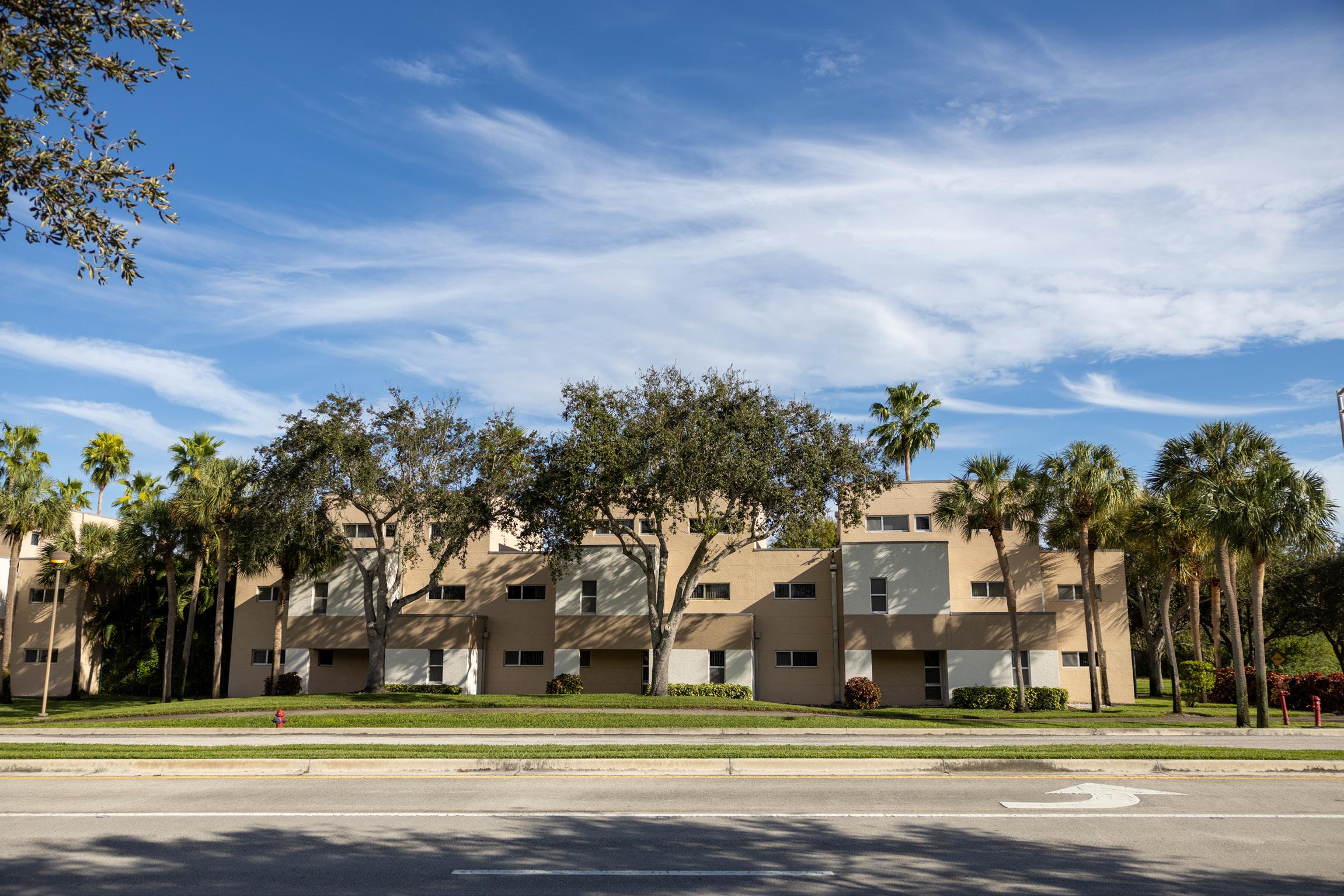
As FAU remains undecided on the demolition of UVA, students are still facing issues in the dorm.Mary Rasura | Staff Writer Photo of University Village Apartments (UVA). Photo by Nicholas Windfelder
